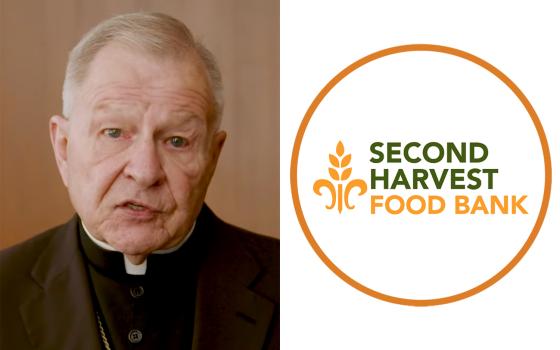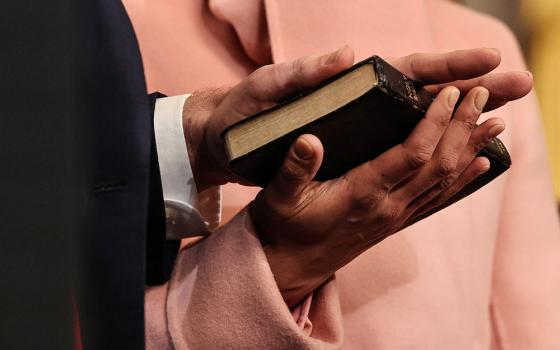The Vatican took an enormously large step towards completing the Catholic church's assault on the scourge of sexual abuse by clergy on Saturday when Pope Francis issued his motu proprio entitled "Come una madre amorevole" or, in English, "Like a loving mother." My colleague Joshua McElwee was yet again first with the story and you can find his report here.
The document helps confront the last, critical piece of the puzzle in any effective strategy to confront the scourge of clergy sex abuse: episcopal accountability. Until bishops know that they will be held accountable for their actions and, perhaps more importantly, for their inaction, all the other architecture for protecting children was sitting on a shaky foundation. You can train ministers who work with children. You can adopt norms like those in the Dallas Charter that established zero tolerance for priests and deacons who abuse a child sexually. You can require lay review boards and have diocesan audits. But, unless the bishops who oversee all this know that they are accountable for enforcing the norms and the culture of zero tolerance, it is easy to see how there can be backsliding.
In far too many depositions pertaining to conduct after, repeat, after, the Dallas Charter on Child Protection was adopted in 2002, we see bishops and other diocesan officials thinking that they can handle Fr. X or that they can get Fr. Y to amend his ways. No, no, no. This is too close to the kind of thinking that got us into the scandal in the first place: That also had a heavy dose of thinking a cover up would somehow serve the church, to say nothing of the careers of the bishops and clergy doing the covering up. But, the idea that we can ignore the rules that are in place to handle something on our own, on an issue like this, has proven to be the opening wedge for a regime of laxity and, consequently, the endangerment of children.
In the end, protecting children requires not only a change in laws, or training, or procedures. It requires a change in culture. And the culture of the Catholic church is shaped enormously by the bishops who lead it. How many new bishops have been consecrated, who were not in the room in Dallas and did not experience the anguish? There is only one living cardinal, Cardinal Roger Mahony, who was on the fateful telephone call with Cardinal Bernard Law, when Law said he would stay and fight if the other U.S, cardinals would support him, and he was met with absolute silence. It is only when new bishops and new cardinals understand the gravity of the issue for their own careers that the culture will really change. Seeing "Spotlight" is not enough.
There has been some confusion in the Vatican about whose job it is to police the compliance of the bishops with their own norms for protecting children. This confusion mirrors that in the 1990s, when it was not clear which dicastery had jurisdiction in child sex abuse cases. This earlier confusion was resolved by giving the Congregation for the Doctrine of the Faith jurisdiction in clergy sex abuse cases. But, the CDF had no jurisdiction to discipline bishops who were not abusers themselves but who tolerated abuse. The new motu proprio vests jurisdiction in these cases with the congregations responsible for naming bishops and confirming heads of religious orders in the first place: The Congregation for Bishops, the Congregation for the Propagation of the Faith, the Congregation for Eastern Churches, and the Congregation for Religious will now be tasked with investigating charges of neglect regarding the protection of children by those who will be most familiar with these men.
There are those who suggest that nothing much has changed. "There is nothing breaking here," Kurt Martens, a canon law professor at the Catholic University of America, told the Associated Press. "The congregations could already do that [investigate and recommend removal of bishops]." Martens led an effort at last year's Canon Law Society meeting to pass a resolution opposing Pope Francis' efforts to streamline the annulment process. Lucky for Mr. Martens that the church is not like baseball or he would have two strikes already!
Similarly, the survivors' organization,
Another concern I have heard this weekend is about personnel, namely that the foxes are still tending the foxes. While always relevant, this is also always unavoidable. Congress sets up its own ethics committee. An editorial board must enforce its own standards of veracity and balance. Many times a powerbroker or even a mere bureaucrat can frustrate an important, even vital, policy initiative. Too often, even the well-intentioned over-think an issue, considering all manner of hypotheticals, forgetting the sage advice to let the difficulties argue for themselves. Change is often prevented and new avenues unexplored in any organization unless there is leadership. The motu proprio makes it clear Pope Francis intends to provide such leadership.
To those who think nothing has changed, I would invoke an historical metaphor. In 1789, the Constitution of the United States was adopted. In 1803, the U.S. Supreme Court issued its ruling in Marbury v. Madison, establishing for all time the principle of judicial review. Nothing in the pertinent sections of the Constitution had changed in those intervening years. The "law" had not "changed." But, what had previously been uncertain -- who had the final say in what was and was not constitutional -- was now explicit, and the subsequent legal and political culture changed enormously, and that change is with us still. If you read the text of the Constitution, it is obvious that the judiciary is the weakest of the three branches. Tell that to Al Gore.
In the case of this motu proprio, reading the text makes it abundantly clear that the Holy Father intends the four dicasteries to take their job seriously. "The document does communicate a sense of urgency and clarity that was not there before. If the dicasteries were hesitant or confused about their role, they no longer have that excuse," Cardinal Sean O'Malley told
There are things that remain to be spelled out, for example, who initiates a charge? Other things are very clear: The legal hurdle for removing a bishop is lower if the charge is negligence regarding child protection than it is for all other forms of negligence. The role and scope of the "College of jurists" the motu proprio establishes will clearly be influential, advising the pope on specific cases and consisting of senior prelates, but it is unclear if they can initiate a case or merely advise on a case started by others. I would expect that this "College of jurists" will itself serve as a prod to any dicastery that drags its feet.
A word about Cardinal Sean O'Malley, without whom none of this would be happening. The rap on the cardinal is that he does not throw his weight around, and that is true. He is not the kind of cardinal who looks at a given situation and feels the need to place his own resolution upon it, and there are plenty of curial officials who wake up every morning thinking the world is their oyster, there to be remade as they wish. But, Cardinal O'Malley's success in getting the glacial processes of the Vatican to respond relatively quickly to the clergy sex abuse issue is, I would argue, precisely a result of his utter lack of guile. No one likes to break up the club and he is doing so. Had some cardinal whose wiliness and capacity for intrigue was well known been leading the charge for these changes, he could have been blocked in part by other cardinals charging him with trying to manipulate the system for his own ends, usually to increase his own power. No one would think this of Cardinal Sean. Just so, he has been able to achieve what no one else has previously been able to achieve: real reform. By way of contrast, Cardinal George Pell is still fighting rearguard actions on the Vatican's finances. Cardinal O'Malley is making real progress on fighting clergy sex abuse and I think that progress is directly tied to his own personal qualities as a leader: His effectiveness is rooted in the fact that "effectiveness" is not his first, or even third, yardstick for measuring success. Quod cumque dixerit facite is his episcopal motto and his yardstick, and it shows.
Rome was not built in a day and it will not be changed in a day. Every one, even a bishop, deserves a system that affords justice. I do not share the usual liberal concern for transparency in such matters because the prospect of false accusations is too great, and a reputation once besmirched, especially on an issue as cringe-worthy as sexually abusing a child, will never be restored. A future pope could surely backslide on these initiatives of Pope Francis. That is why we need to change the culture. This motu proprio helps achieve that. It should be applauded not denigrated.
[Michael Sean Winters is a Visiting Fellow at Catholic University's Institute for Policy Research and Catholic Studies.]



